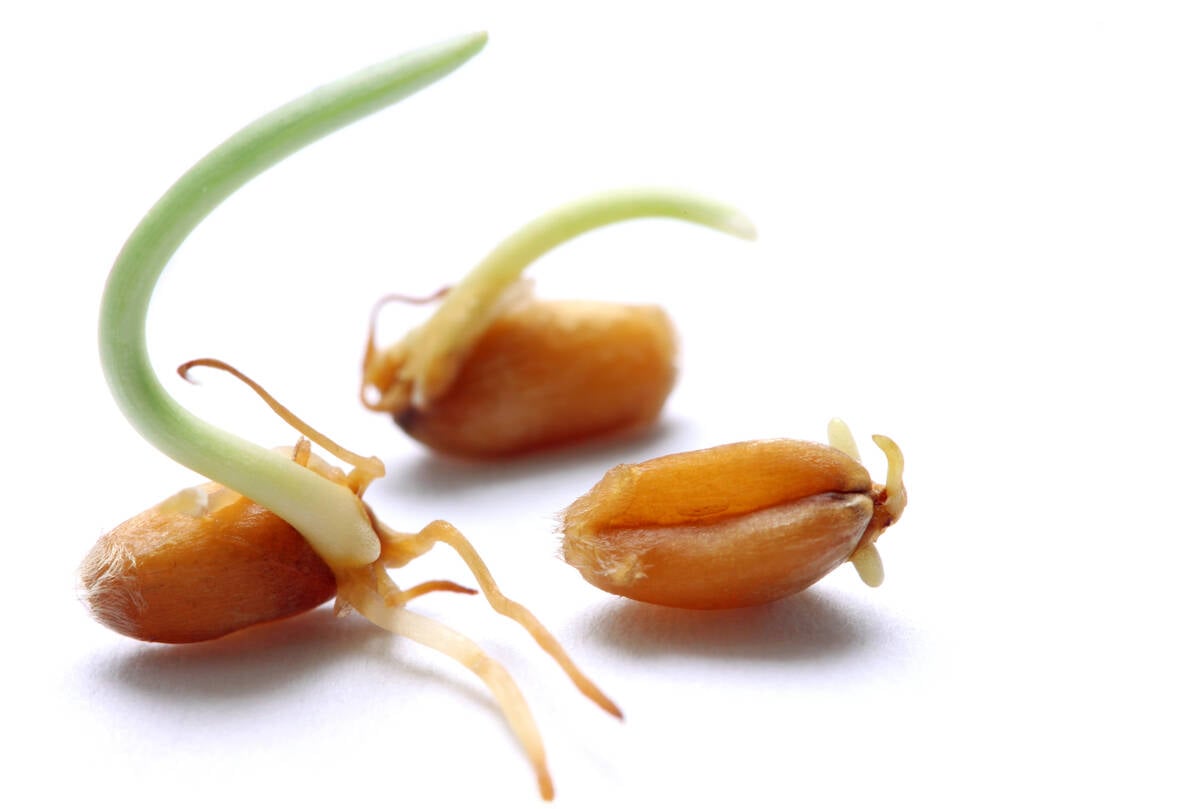Thousands of prairie fields are a mess this year. They haven’t been seeded and are too wet to be sprayed or worked.
But some farmers might be looking at yellow fields of volunteer canola and wondering if there’s a golden lining to this production cloud: why not let the volunteer crop grow and then harvest it?
It’s a thought virtually no canola agronomy expert supports, and something that seed companies are making difficult or impossible.
“They really need to think: do I want to make this my canola crop in the rotation,” said Canola Council of Canada agronomy expert Derwyn Hammond.
Read Also

Manitoba farmers fight sprouted wheat after rain
Rain in mid-September has led to wheat sprouting problems in some Manitoba farm fields.
“It’s not a good idea.”
Problems include:
• poor yields from crops that are unevenly spaced, with a potential of about 25 percent of an intentionally seeded field
• breakdown of herbicide resistance because the initial seed was a hybrid product
• high chances of disease outbreaks from growing canola-on-canola with volunteer seeds that will have lost some of their original protection and that are being grown in soaked soils
• uneven maturities across the field, making harvest timing difficult
Farmers also have a host of legal problems to deal with if they try to harvest a crop that is covered by a technical use agreement, which applies to almost all canola acreage in Western Canada.
Bayer, whose varieties dominate the flood zone of Manitoba, is refusing to allow farmers to harvest volunteer crops grown from its seed.
“While we sympathize that this season continues to be … very difficult and understand the desire to attempt to harvest a volunteer canola crop, Bayer CropScience cannot endorse this practice or support the application of Liberty herbicide to control weeds within these fields,” said Bayer spokesperson Derrick Rozdeba.
Monsanto also disagrees with the practice but is allowing farmers to harvest volunteer Roundup Ready crops under strict conditions.
“We think it’s a really, really, really bad idea for a number of agronomic reasons,” said Trish Jordan of Monsanto.
“However … we do get calls from growers, so in the incredibly wet years, when farmers are impacted like that, even though we don’t think it’s a good idea, we have put together a program.”
Farmers need to register the crop with Monsanto, sign a special agreement and pay the typical $16.34 per acre, the same as an intentionally seeded crop.
“We are not encouraging or validating this process, but we will enable it,” said Jordan.
Stan Jeeves, a farmer from Wolseley, Sask., and member of the Saskatchewan Canola Growers Association, said harvesting a volunteer crop is not generally worthwhile.
The crop might look good from the road, but inside the field it’s likely to be diseased and patchily emerged and maturing.
Jeeves said seed companies should co-operate with farmers who want to harvest a volunteer crop if they feel they don’t have better choices, but he supports the intellectual property rights of the companies because that is what has provided today’s best canola varieties.
“We know that’s what drives innovation in the industry,” he said.
“That’s what benefits farmers in the long term. So we certainly believe intellectual property needs to be paid for, otherwise there’s no incentive for the developments to occur.”
Jeeves said farmers considering harvesting volunteer canola had better tell their seed company first.
“Communication is key,” said Jeeves. “Be up front.”















